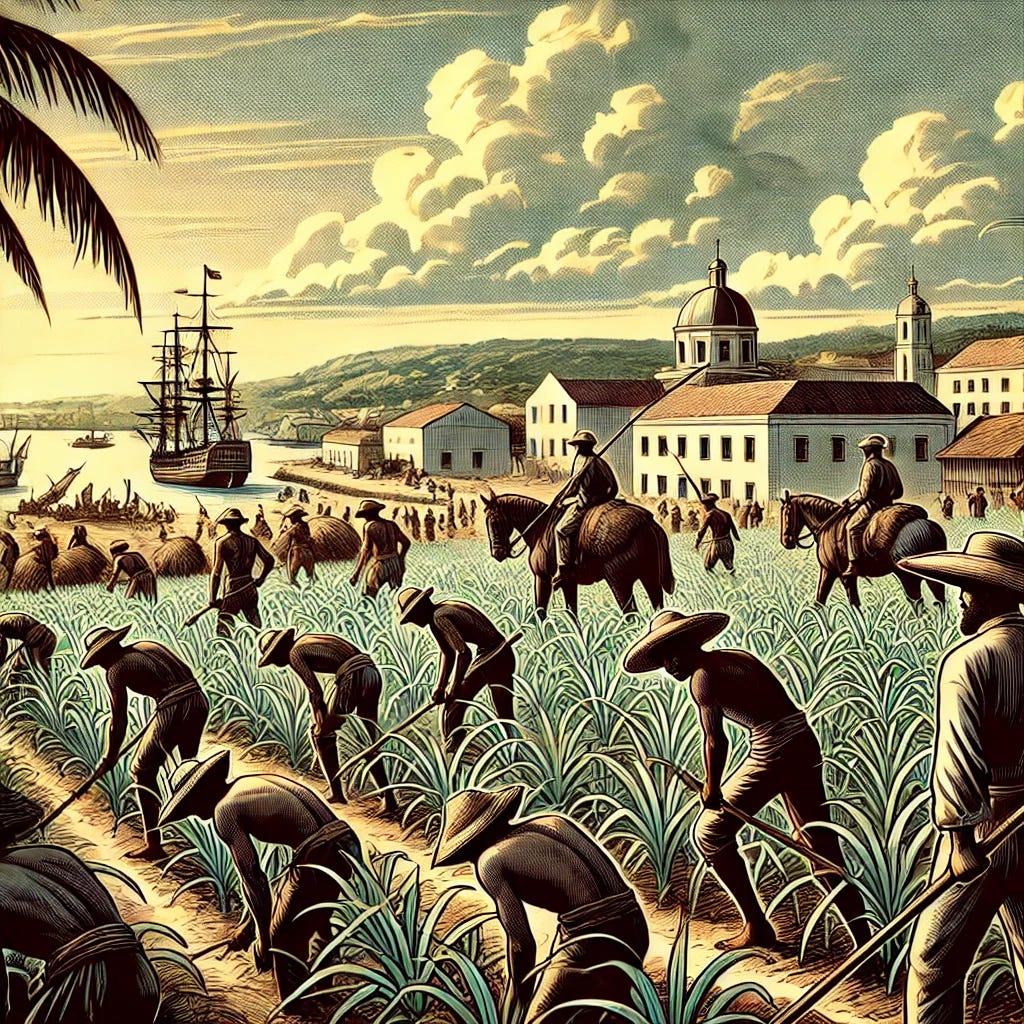For nearly all of the 1700s, Saint-Domingue stood as one of the most lucrative colonies anywhere in the world. Enslaved laborers from all over western and central Africa were forced to grow and harvest sugar cane, which the French then used to fuel her global ambitions.
Toward the end of this century, the third great revolution of the modern era took place, forming only the second ever republic in the west (after the US). This revolution sent shockwaves around the world because slaves had overthrown their masters and taken complete control. European nations looked on with a mixture of terror and disdain, with some begrudging admiration for the military prowess and strategic brilliance of the leader of the revolution, Toussaint l’Ouverture.
CLR James’s The Black Jacobins covers these events incredibly well, frequently citing first-hand sources including Toussaint’s own correspondences and publications, and I recommend that book highly if you’d like to dive in deeper. The story is inspiring and incredible.
During the brutal century of enslavement, communication was important and necessary. The problem was that you had maybe a dozen different languages at play.
You had the French colonists who handled the administration of the island and the bureaucracy, along with slave masters barking orders in their original French language. Then, you had enslaved Africans who spoke the languages of their tribe or ethnic subgroup, like the Yoruba, Fon, and Ewe.
In this cacophony of languages, the overwhelming majority of slaves spoke a language belonging to the Niger-Congo language family, which made it just barely possible for slaves from different tribes to communicate with one another. This is a bit like when you have someone who speaks Italian and someone who speaks French: they can make it work, although there’s not likely to be much room for nuance.

This was enough to start to develop something of a common tongue among slaves, but since the French also needed to communicate with the slaves, French was also tugging at this developing method of communication right from the beginning.
The new hybrid language that developed among these Europeans and Africans is a great example of a pidgin, a pseudo-language that is predominantly used to bridge gaps. You can see pidgins anywhere there’s multilingual trade happening, because it turns out that people care a great deal more about doing business than they care about having proper grammar.
Pidgins don’t have too much time for grammar, but instead do just enough to get that business done. Saint-Domingue saw a language developing with French vocabulary, but with a grammatical structure that was more friendly to the Niger-Congo family speakers. The result was a functional way to communicate, but little more.
Toussaint didn’t get to see the completion of the Haitian Revolution, nor did he get to see Haiti become an independent republic—truly an incredible feat as slaves had become as free as one could get. However, by the time the French were kicked out, the pidgin language was the only potential candidate for a universal language.
Pidgins can become creoles when they’re turned into the official language of the majority. In Haiti, this happened when slaves who spoke pidgin began having children, who then learned this new way of speaking before learning any other languages. In turn, they taught their children the language they knew best, and so it went.
I first encountered the Haitian creole language some time during the late 90s, when I was working as a cook on a line, This was my first exposure to a creole, at least insofar as talking regularly with a native speaker.
I had a little bit of French from middle and high school, and I thought I knew a bit about Haiti—particularly, I thought French was the official language. I could communicate un peu with Celio, Luis, and Eli, but their English was just so much better than my French that we pretty much only communicated in English.
I got to know all three of these gentlemen while we faced off against a common threat: the dinner rush. Over time, we learned to communicate with one another ever better, creating our own sort of pidgin together to bridge the gap between Haitian creole and English. We made it work with kitchen pidgin.
I didn’t have an iota of appreciation for the legacy these three gents came from, but I did get to know and like all three. We busted one another’s balls during the dinner rush, and we played pranks on each other.
Restaurant kitchens are some of the best places in the US to meet people from other worlds. In addition to the Haitians, I was able to become friends with workers from Kenya, central and South America, and the Middle East, among others. These were first generation immigrants with incredible stories of their journey to tell, but of course I rarely thought to ask back then.



English itself is a Creole language as you've pointedo ut many times.
The great Alexandre Dumas wrote a novel about the revolution called "Georges" which was recently unearthed after years of obscurity. Dumas was himself of African ancestry, so the fact that he takes the slaves' side is no surprise.